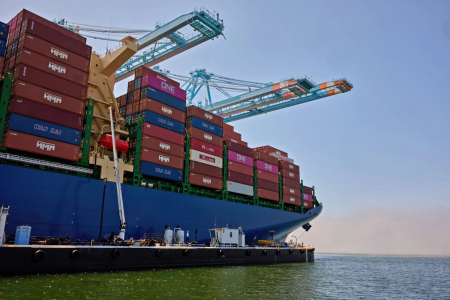Most businesses passing along cost of tariffs, study finds

Most businesses passing along cost of tariffs, study finds
A survey by the Federal Reserve Bank of New York found that 45% of service firms and 31% of manufacturers in New York and the New York City metro area that were impacted by tariffs fully passed tariff-related costs to their customers.
The impact of the tariffs imposed by the Trump administration is starting to hit home.
A survey by the Federal Reserve Bank of New York found that 45% of service firms and 31% of manufacturers in New York and the New York City metro area that were impacted by tariffs fully passed tariff-related costs to their customers.

A new report shows 45% of service firms and 31% of manufacturers in New York that were impacted by tariffs passed those costs to their customers. NEW YORK TIMES
The survey was based on responses from 110 manufacturing firms and 200 service firms in New York State and Northern New Jersey, just before the Trump administration lowered its tariffs on China to 30% from 145%.
About one quarter of the service and manufacturing firms reported absorbing the higher costs of the tariffs, instead of passing along the increased expenses. The rest reported passing along some of the tariff-related costs.
“These decisions are influenced by the degree of competition in the marketplace, potential customer reactions, and the ability to maintain profit margins, among other factors,” the Federal Reserve Bank of New York said in its summary of the results.
The companies that did pass along tariff-related price increases to their customers tended to act quickly. Thirty-six percent of the manufacturers and 39% of the service firms reported that they did so either within one day or one week.
Companies impacted by higher tariffs were asked about the impact on their finances, and how they had adjusted their operations over the previous six months.
- Forty-five percent of the service firms and 42% of the manufacturers said their net income had decreased either somewhat or strongly.
- Seven percent of the service firms and 10% of the manufacturers reported their profits had increased somewhat. The companies that saw an increase may be in industries protected from tariffs, particularly those that make items domestically that compete with tariffed goods that are imported to the United States.
- About half of the businesses in the survey reported raising the selling price of their goods and services directly subject to tariffs.
- The report also found a significant share of businesses raised the selling prices of goods and services unaffected by tariffs. Twenty-seven percent of the manufacturers and 20% of the service firms said they took that step.
The Federal Reserve Bank of New York drew a comparison to 2018 and 2019, when tariffs increased on washing machines from China. Some companies increased their prices for dryers, even though those machines were not subject to tariffs.
Eighteen percent of the service firms and 15% of the manufacturers reported reducing their headcount.
The changing nature of the tariffs has been a challenge for companies trying to figure out what to plan for.
About half of the service firms expected tariffs to increase in the next six months, while a third expected a decline. Among manufacturers, about a third expected tariffs to increase, while more than half expected them to decline.
“Many businesses expressed difficulty making decisions and determining the appropriate pricing strategies under such heightened uncertainty,” the report said.
About 40% of the manufacturers and about 35% of the service firms that responded to the survey are based in upstate New York.
